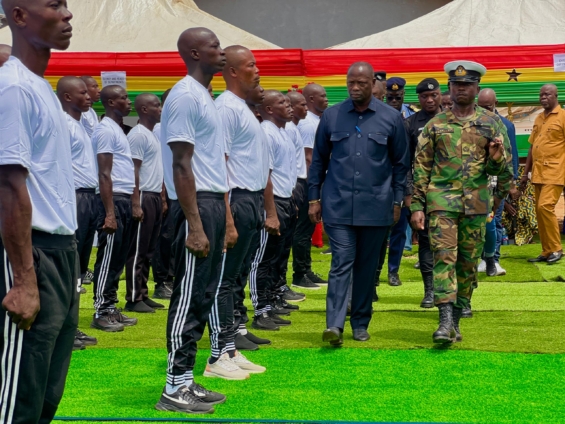The Minister for Lands and Natural Resources, Emmanuel Armah-Kofi Buah, has strongly dismissed claims that the deployment of river guards to protect Ghana’s water bodies is merely a "job for the boys."
Instead, he insists that the initiative is a well-structured programme designed to curb illegal mining and water pollution, with strategic backing from the Ghana Navy.
His response addresses concerns about whether the initiative is simply a way to provide jobs for a select group of people.
"It is a job for the boys. This is a well-thought-out programme, shepherded by the Ghana Navy. The Navy is overseeing its training at its bases, and the plan is to establish 12 riverine bases across the country, including in Ashanti, Eastern, North, and Western regions. Since the Navy cannot be everywhere at once, these guards will serve as the eyes and ears on the ground, ensuring quick response when needed," he explained on JoyNews' Newsfile on Saturday, March 12.
Also, addressing concerns that river guards are unarmed and lack enforcement powers, the minister clarified that their primary role is to monitor and serve as first responders, relaying critical information to the Ghana Navy for rapid intervention.
The river guards are selected from communities directly affected by illegal mining, making them familiar with local challenges and dynamics, he said, adding that, this community-based approach fosters accountability and increases their effectiveness in safeguarding water bodies.
When questioned about the possibility of river guards being compromised, as has sometimes happened with security forces, the minister acknowledged the risk but maintained that inaction was not an option.
"Everything you said is true. But what we are doing is better than doing nothing at all. The alternative—leaving our water bodies unprotected—is simply unacceptable," he stated.
The Blue Water Initiative is part of the broader ‘Reset Ghana Agenda’ and aims to train 2,000 personnel nationwide by the end of the year. At the Ghana Navy Forward Operating Base in Ezinlibo in the Western Region, 400 recruits are currently undergoing intensive training to become Blue Water Guards.
Their primary responsibilities will include monitoring river health, identifying illegal mining activities, and working with local communities and traditional authorities to tackle water pollution.
Latest Stories
-
Abdul-Rasheed Saminu sets new National Record in the men’s 100m, books qualification for Tokyo World Championships
47 minutes -
Supreme Court allows Trump to revoke legal status for 500,000 migrants
1 hour -
Eugene Boadi: Bryan Acheampong’s impact on entertainment sector
1 hour -
Faizan Zaki, 13, crowned US National Spelling Bee champion
1 hour -
US to double tariffs on steel and aluminium imports to 50%, Trump says
1 hour -
Wontumi denied access to family – lawyer confirms amidst detention
2 hours -
Meet the Brazilian sensation Fonseca hoping to shock Draper
2 hours -
Women ‘worthy’ of French Open night sessions
2 hours -
Alcaraz made to suffer in four-set win over Dzumhur
2 hours -
Minority Caucus probe into TV doctor Ann Sansa Daly’s credentials
3 hours -
In Oval Office farewell, Trump says Elon Musk is ‘not really leaving’
3 hours -
Suspect in South African student’s murder killed in police shootout
3 hours -
Ghana hits milestone in local vaccine production – National Vaccine Institute CEO
3 hours -
I’m grateful to Bryan Acheampong, he filed docs exceeding GH₵50m bail – Wontumi’s Lawyer
4 hours -
Wontumi files motion to review his bail conditions
4 hours

